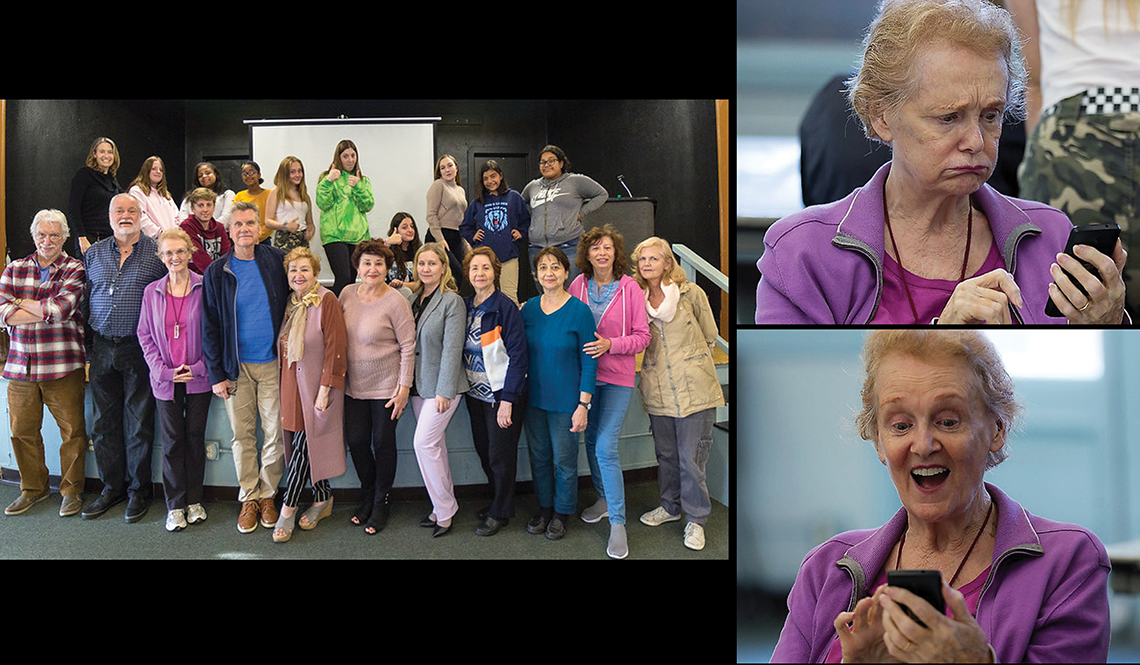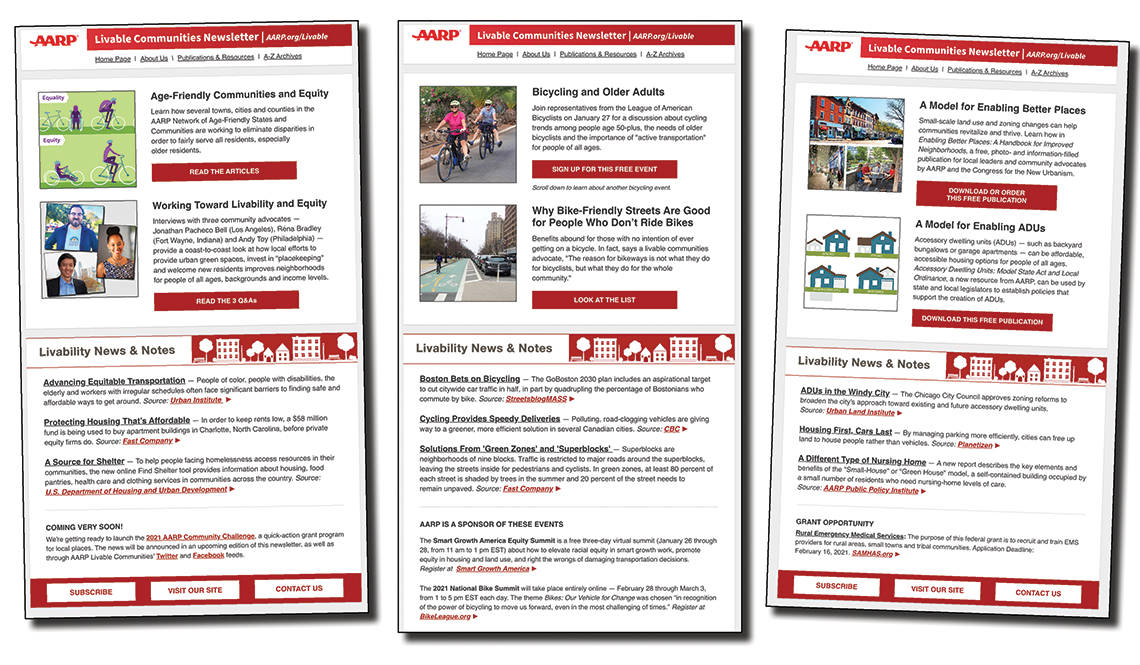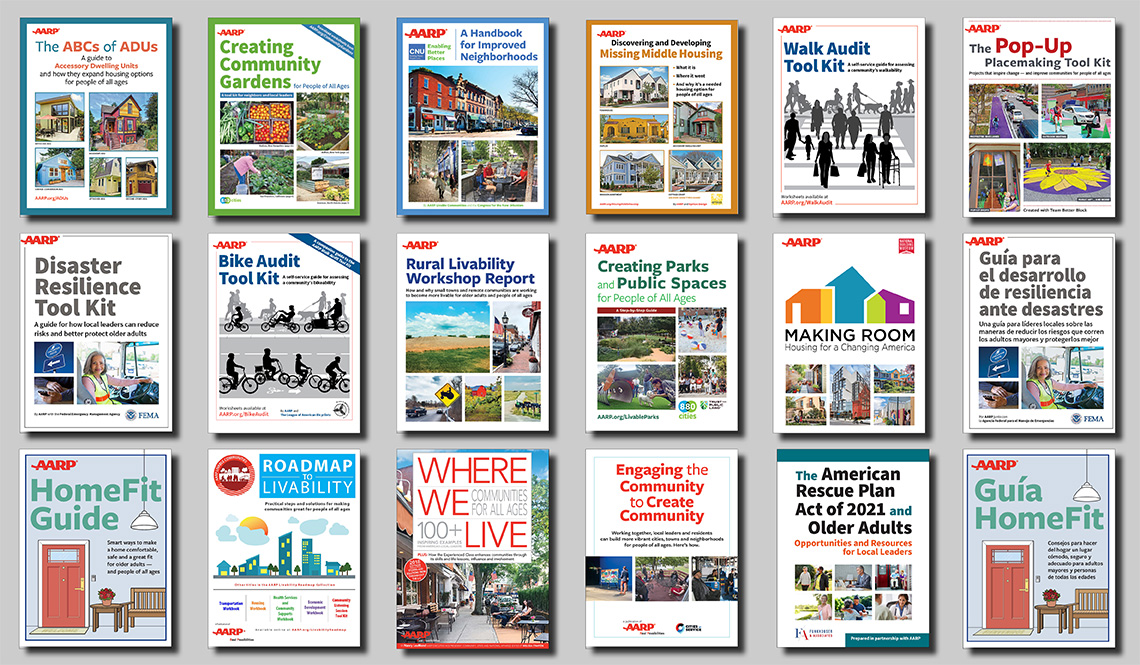Age-Friendly West Hollywood and Equity
How the California city is working to ensure fair access and opportunities for its older adults
The Community
Once an unincorporated area of Los Angeles County, West Hollywood, California, has been an independent city since 1984, when cityhood was pursued by a coalition of LGBT activists, older adults and renters seeking a community where they could live free from discrimination and age in place. West Hollywood (population 36,000, about 15 percent of whom are age 65 or older) is the first city in the nation to have a majority openly gay and lesbian governing body. The city joined the AARP Network of Age-Friendly States and Communities in 2016 and adopted its age-friendly action plan that same year.
Community Representatives
- Lindsey P. Horvath, Mayor, West Hollywood
- Corri Planck, Strategic Initiatives Manager, City of West Hollywood
- Diane Kahn-Epstein, Strategic Initiatives Program Administrator, City of West Hollywood
Equity Focus
- LGBT older adults
- Multicultural engagement
- Racial equity
Partner Organizations
The Work
Planck explains the city’s past, present and future age-friendly work.
The City’s Founding Informs Values, Actions
West Hollywood was founded in 1984, during another pandemic, HIV/AIDS, which had an outsized impact on the community. "From the beginning, the West Hollywood City Council was committed to affordable housing, non-discrimination measures and the provision of vital social services for our residents," says Planck. "Those same values inform our work today.”
“West Hollywood’s age-friendly work is directed toward projects and policies that promote health, safety and equity for three distinct older adult populations that are often disenfranchised and discriminated against — those who are predominantly Russian-speaking, those living with HIV/AIDS and those who are LGBT," explains Planck.
A Deeper Look at Racial Equity
When West Hollywood was founded, some of the first policy actions were to address income disparities and discrimination. These included the creation of a rent control (now stabilization) ordinance that prohibited discrimination based on sexual orientation and HIV status and created domestic partnership protections and more.
"The City Council recently called for an analysis of social services data to ensure we are meeting the needs of people of color," says Planck. The city is examining health disparities and gaps in services. It has also joined the Government Alliance on Race and Equity (GARE), a national network of governments that are working to achieve racial equity. In addition, Planck notes, the city has formed a Diversity, Equity and Inclusion Committee to explore and enhance policies and programming citywide.
Kahn-Epstein provides information about programming supported by the city and implemented through community partnerships.
Partners Evolve to Serve Changing Needs
“We have longstanding partnerships with various nonprofit agencies, and that has built trust on both sides for exploring pilot programs that can meet the community’s evolving needs," says Kahn-Epstein. Examples include:
“Our older adult population has been a force in our city, helping lead the effort for West Hollywood to become an independent city. From our LGBTQ community and long-term HIV survivors to our Russian-speaking immigrants from the countries of the former Soviet Union, our community is strengthened by their unique experiences and strength of spirit. They make our city the vibrant and diverse community it is."
— Lindsey P. Horvath, Mayor, West Hollywood, California
- The Alliance for Housing and Healing, which originally provided financial support solely to persons living with HIV/AIDS to pay for rent, utilities and pharmaceuticals, and housing case management for individuals who are homeless or at risk of homelessness. The alliance recently created an aging in place program to include supplemental rental assistance to all seniors (age 55 and older) residing in the city of West Hollywood who struggle to pay rent. "In response to the pandemic, the alliance expanded eligibility for the rental assistance program to include seniors impacted financially by COVID-19," Kahn-Epstein says.
- Project Angel Food began by providing home delivered meals tailored to individual nutritional needs for people living with HIV. It later expanded to serve others with serious or debilitating chronic illnesses. During COVID-19, Project Angel Food expanded its services to assist a broader cross section of older adults who are living on a fixed income, facing food insecurity and are unable to shop for and prepare their own meals.
- APLA (AIDS Project Los Angeles) Health started in the early days of the HIV/AIDS pandemic providing support groups, dental care, home health care, benefits assistance, case management, housing and more. APLA now has a program tailored for men of all ethnicities who are 50+ and living with HIV. HIVE (HIV Elders) is designed to address stigma, social isolation and provide social support and empowerment by offering discussion groups, workshops and community building activities.
- The Senior Services program of the Los Angeles LGBT Center offers affordable housing and case management, as well as activities programming, which has gone virtual during COVID-19. The center recently added programs to address racial understanding and racial inequities.
- Working with Jewish Family Service LA, the city created a class called “Making Your Smartphone Work for You.” The popular class was intergenerational, bilingual (English and Russian) and provided a take-home manual. "Bilingual youth from our West Hollywood Teen Center helped older adult participants as they practiced moving icons, switching ringtones and adjusting the volume and text size," Kahn-Epstein explains.
"During the COVID pandemic, these collaborations created a stronger safety net for many older adults living in West Hollywood by providing financial assistance, access to food, mental health support and connection in a time when some other resources have been restricted and social isolation and loneliness are even more prevalent," says Kahn-Epstein.
Related Resources
- Government Alliance on Race and Equity
- West Hollywood Aging in Place Program
- West Hollywood Aging in Place Strategic Plan
AARP Links
- Learn about the AARP Network of Age-Friendly States and Communities
- Check out the network's Member List
- Connect with AARP California
- Find Age-Friendly Responses to COVID-19
Visit "Age-Friendly Network Communities and Equity" to read about another community. »
Reported by Mary Kay Bailey | Fall 2020 | Population data from the U.S. Census
Stay Informed
The weekly, award-winning AARP Livable Communities e-Newsletter provides local leaders with information and inspiration for making their town, city or neighborhood more livable for older adults and people of all ages. Subscribe today!
AARP.org/Livable
Enter a topic, name, place, etc.




